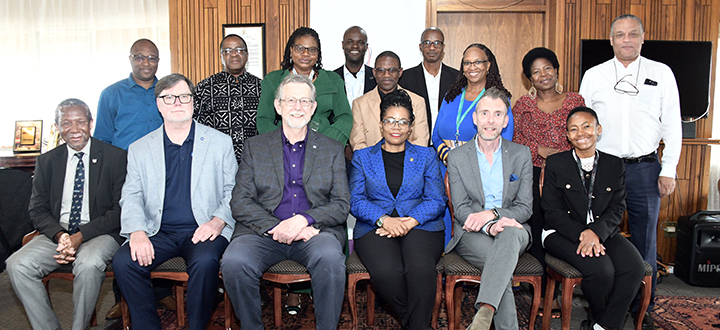News & Events
Unisa hosts Africa’s foremost astronomical gathering
Unisa, in partnership with the African Astronomical Society (AfAS), the United States National Aeronautics and Space Administration (NASA), the Department of Science and Innovation, and Hackathons for Development (Hack4Dev), is currently hosting the AfAS Conference and General Assembly 2025, which takes place from 23 to 28 March 2025 at Emperors Palace in Johannesburg.

Some of the delegates who engaged in a meet-and-greet with Prof Puleng LenkaBula, Unisa Principal and Vice-Chancellor (seated, third from right), members of the university’s executive management, and the leadership of the College of Science, Engineering and Technology, were (seated) Dr Jim Adams (second from left), NASA scientist and engineer, retired, Dr James L Green (third from left), NASA chief scientist, retired, and Dr Marc Klein Wolt (second from right), Director at Radboud Radio Lab, and Assistant Professor of Astronomy at Radboud University
This hybrid annual gathering celebrates Africa’s flourishing astronomy community, bringing together scientists, students, educators, and international partners to connect, share, and plan for the future of African astronomy. The conference is strategically aligned with Unisa’s efforts to promote space studies and related research and programmes, particularly within the university’s space studies and Square Kilometre Array catalytic niche area.
Speakers at the conference include the Minister of Science, Technology, and Innovation, Dr Bonginkosi “Blade” Nzimande, Unisa Principal and Vice-Chancellor (VC), Professor Puleng LenkaBula, AfAS President, Professor Thebe Medupe, President of the International Astronomical Union (IAU), Professor Willy Benz, European Astronomical Society (EAS) President, Professor Sara Lucatello, and American Astronomical Society (AAS) President, Professor Dara Norman.
Key discussions will include the legacy of the 2024 International Astronomical Union General Assembly in Cape Town, updates on flagship projects, and strategies for the continued development of astronomy infrastructure across the continent. Additionally, sessions will focus on leveraging astronomy for development, fostering youth interest in science, and strengthening collaborative networks within Africa and globally.
Significance of the event for Unisa
Speaking about the significance of hosting the event at a meet-and-greet with conference partners, the VC emphasised that the visit by NASA, AfAS, and other astronomical organisations is an important milestone for the university. She noted that it demonstrates the university’s commitment to advancing the scientific agenda and optimising research through catalytic niche areas, which have proven successful.
“Furthermore,” she said, “it highlights Unisa’s role in consolidating science that is both relevant and impactful on a global scale. This is exemplified by the participation of not only NASA astronomers but also those from across Africa and beyond.”
The VC expressed her excitement about the project, noting that a key anchor to its success is Unisa’s Professor James Chebueze, Professor of Astronomy and Astrophysics, with the valuable support he received from Professor Bhekie Mamba, Executive Dean of the College of Science, Engineering and Technology (CSET), in inviting key participants and hosting the conference.
Reclaiming leadership in astrophysics research
Mamba shared his perspective on the importance of the event for the college. He stated, “It actually means that we are reclaiming our position as the leader in astrophysics research. For a long time, this research was renowned at Unisa. Over the years, it dwindled due to a lack of attraction for and interest from students, as well as the departure or retirement of key personnel.”
He further noted that with the VC’s 2021 announcement designating astronomy as one of the university’s catalytic niche areas, CSET was given the opportunity to refocus its efforts, as resources were made available to support this initiative.
Mamba emphasised the importance of recruiting renowned scholar Chebueze to lead the charge. Chebueze’s international recognition, along with the extensive network he built over the years and during his studies in Japan, enabled Unisa to regain its standing and join esteemed international societies.
His presence also made it possible for the university to host the AfAS Conference and attract representatives from NASA and other global experts. “Had it not been for his international stature, we would not have been able to achieve this,” said Mamba.
He also noted that this achievement reflects the country’s investment in the South African Astronomical Observatory (SAAO), ensuring its full utilisation rather than simply checking a box. Additionally, the renewed focus on astronomy has reignited interest among black students, signalling a promising future for the sustainability of the field. "With more academics entering the field, the prospects for this research area are brighter than ever," Mamba concluded.
* By Edgar Rathelele, Senior Media Officer, Department of Institutional Advancement
Publish date: 2025-03-25 00:00:00.0

